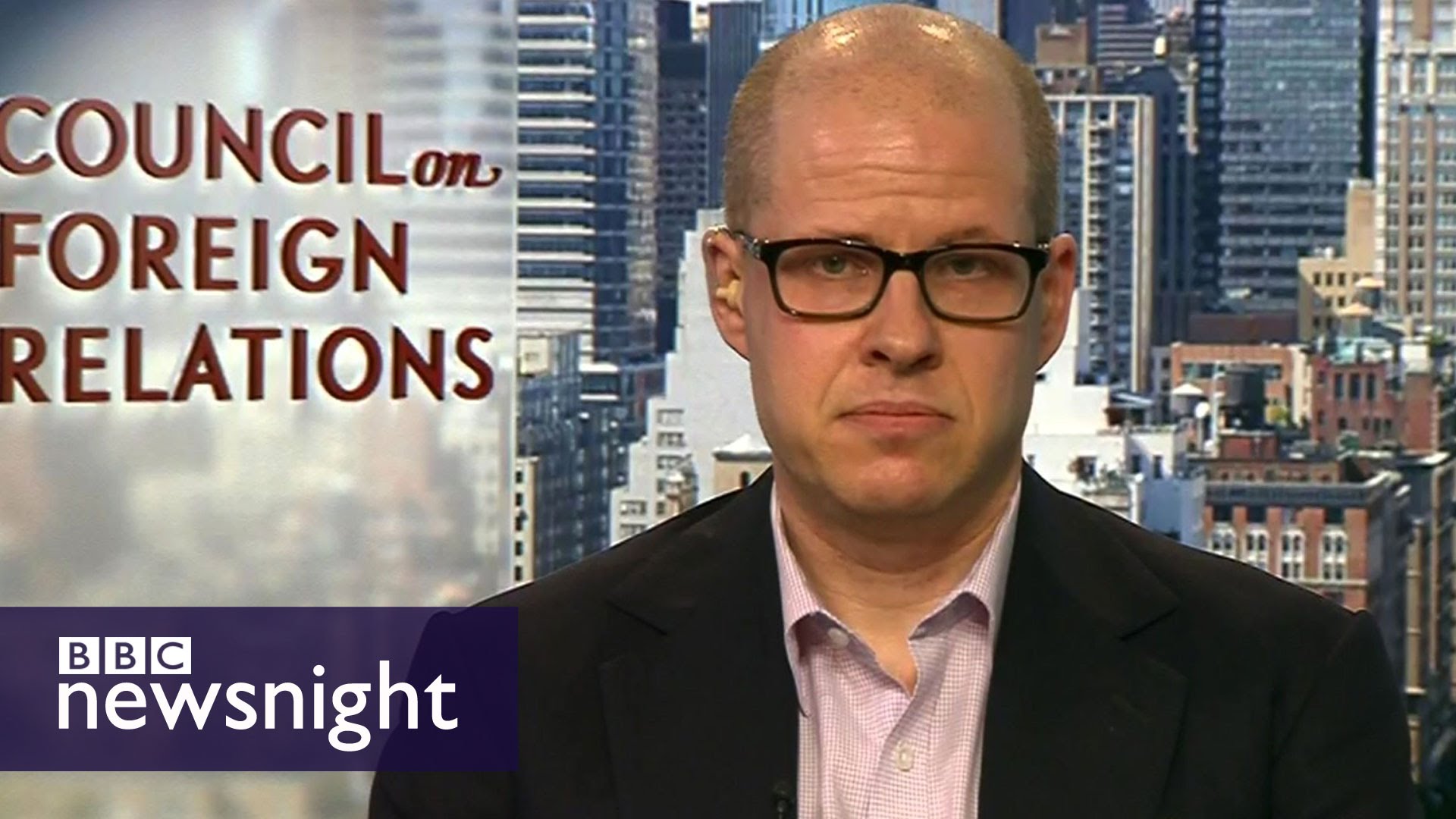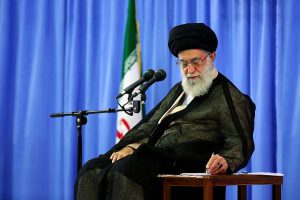by Jim Lobe
Prominent neoconservatives, led by Bill Kristol, have played leading roles in trying to block Trump’s nomination or repeal it somehow. They’ve lined up fellow-neocons to sign letters opposing his election and/or declining to serve under him should he actually make it to the White House. Some, albeit a relatively small minority so far, have gone so far as to publicly endorse Hillary for president, if only as the lesser evil. Among the most outspoken in the latter group are Bob Kagan, Max Boot, Bret Stephens, and Eliot Cohen. Indeed, it’s very difficult to find a neocon at the moment who publicly supports the Republican candidate.
As I wrote previously, the reasons are many: fear of “America First” isolationism and all it implies for U.S. foreign policy and alliances; the bromance with Putin; the crudest kinds of nativism, racism, and misogyny expressed at his rallies (and the fear that anti-Semitism can’t be far behind); authoritarian tendencies (to say the least); shocking ignorance; lack of self-restraint; hyper-narcissism—all valid points with which I can’t find much fault.
But what disturbs me is the refusal—even among those who say they’ll vote for Hillary—to admit their own contribution to the rise of Trump and Trumpism. Their attitude recalls what happened after the Iraq War went south. With a few exceptions, neocons denied that they anything to do with getting us into the greatest U.S. foreign policy debacle since at least the Vietnam War. Or they maintained that the invasion was still a great idea, but the occupation (for which they also insisted they bore no responsibility) was botched. Or they argued that the “surge,” which they also promoted, was a total success, but the Obama administration subsequently blew it. As with Iraq, neocons have so far refused to take any responsibility for helping create the environment in which Trump’s rise has been made possible.
Boot Shifts the Blame
Consider this recent op-ed published in The New York Times by Boot, entitled “How the ‘Stupid Party’ Created Trump.”
During the Reagan years, the G.O.P. briefly became known as the “party of ideas,” because it harvested so effectively the intellectual labor of conservative think tanks like the American Enterprise Institute and the Heritage Foundation and publications like The Wall Street Journal editorial page and Commentary. Scholarly policy makers like George P. Shultz, Jeane J. Kirkpatrick and Bill Bennett held prominent posts in the Reagan administration, a tradition that continued into the George W. Bush administration — amply stocked with the likes of Paul D. Wolfowitz, John J. Dilulio Jr. and Condoleezza Rice.
In recent years, however, the Republicans’ relationship to the realm of ideas has become more and more attenuated as talk-radio hosts and television personalities have taken over the role of defining the conservative movement that once belonged to thinkers like Irving Kristol, Norman Podhoretz and George F. Will. The Tea Party represented a populist revolt against what its activists saw as out-of-touch Republican elites in Washington.
And here’s Boot’s conclusion:
Even if we can avoid the calamity of a Trump presidency, however, the G.O.P. still has a lot of soul-searching to do. Mr. Trump is as much a symptom as a cause of the party’s anti-intellectual drift. The party needs to rethink its growing anti-intellectual bias and its reflexive aversion to elites. Catering to populist anger with extremist proposals that are certain to fail is not a viable strategy for political success.
So, the responsibility, according to Boot, for the rise of Trump and Trumpism lies with the Tea Party and “talk-radio hosts and television personalities” and not with those “conservative think tanks” like AEI and Heritage or publications like the Journal’s editorial writers and Commentary. It presumably has nothing to do with Boot’s fellow neocons for whom “soul-searching” might also be in order.
But who extolled the Tea Party and sought to ride it to power? What “conservative think tanks” supplied the guests to all those talk-radio hosts and television personalities to “cater to populist anger with extremist proposals.” Who fanned that “reflexive aversion to elites” or the “anti-intellectual drift?”
The Standard Sets the Standard
Let’s start with a publication that Boot somehow neglected to name even though he’s a contributing editor: The Weekly Standard. Its editor for 20 years now has been Bill Kristol, co-founder of the Project of the New American Century (PNAC), who has so often acted as the hub for the aggressive nationalist (or “Jacksonian”) Christian Right and neoconservative wings of the GOP whose coalition his father Irving did so much to forge to defeat Jimmy Carter’s re-election bid in 1980. That coalition was the tiger that the neocons rode to the invasion of Iraq 23 years later.
In Boot’s golden years of the 1980s, the younger Kristol, then known as “Dan Quayle’s brain,” played a leading role in the “family values” campaign against, among other things, Murphy Brown’s unwed motherhood, a significant waystation on the road to the “anti-intellectual bias” of which Boot complains today. That particular contribution to anti-intellectualism and “populist anger,” however, pales in comparison to Kristol’s promotion of then-Alaska Gov. Sarah Palin, a clear precursor and early Trump endorser, as John McCain’s running-mate some 16 years later. Lest we forget, Kristol positively gushed after her nomination, in precisely the same way that Trump’s new campaign chief, Breitbart’s Stephen Bannon, would later extol Palin in his 2011 fawning biopic about her (“…[S]he is an existential threat to the establishment”). Here’s Kristol:
A spectre is haunting the liberal elites of New York and Washington–the spectre of a young, attractive, unapologetic conservatism, rising out of the American countryside, free of the taint (fair or unfair) of the Bush administration and the recent Republican Congress, able to invigorate a McCain administration and to govern beyond it.
Paul Rosenberg makes the point in the title of his excellent Salon essay in June about Kristol’s anti-Trump campaign: “Bill Kristol Protests Too Much: It’s Kristol, Not Donald Trump, Who Dumbed Down the GOP.” Subtitle: “Wait, the man who brought us Palin, Quayle and Thomas thinks the party is being overrun by a know-nothing? Rich!”
Indeed, Kristol’s Standard has fed its readers a steady diet of anti-“elite” rhetoric for two decades. Just type in “elite” on the website’s Search application. In the last three years, no less than 511 articles, blog posts, or podcasts mentions the word, with Kristol himself leading the pack with 91 posts, followed by his son-in-law, Matthew Continetti, with 84. Talk about an idee fixe. If Boot is worried about the GOP’s “reflexive aversion to elites,” he might start by talking to his editor. (And when Trump rails against political correctness, he’s merely echoing another favorite Kristol hobby horse, which one of Boot’s Reagan-era intellectual heroes, Bill Bennett, rode to fame and fortune.)
The Journal and Commentary Pile On
As to the other publications Boot cites, the Journal’s editorial board and Commentary (to which Boot is a regular contributor), it’s just hard to take him seriously. It’s not for nothing that the long-standing joke among the Journal’s generally excellent reporting staff has been that the paper didn’t need a comics section when the editorial pages sufficed. How often have those pages promoted nutty conspiracy theorists, from Claire Sterling to Laurie Mylroie to the “Terror Master” wizard and serial intriguer, Michael Ledeen? Or all manner of Islamophobes, Iranophobes, and, Arabophobes? (See Bret Stephens’ most recent column which Eli Clifton commented on Wednesday.) Who can forget all the effort the editorial board spent on proving that Saddam Hussein was behind 9/11? Or the op-ed by Bernard Lewis it published almost exactly ten years ago in which he predicted that Israel could very well be subject to an apocalyptic nuclear attack by Iran two weeks later (precisely on August 22, 2006)?
In apparent revolt against the scientific elite, the Journal’s editorial pages have also been the nation’s most consistent and influential platform for climate change deniers for some two decades now. So, when Trump calls global warming a “hoax,” perhaps he got the idea from “the intellectual labor” of the Journal’s editorial board.
For those contributors who seek personal or professional publicity, an op-ed in the Wall Street Journal certainly qualifies for invitations to Fox News and other broadcast news and talk shows of the kind that Boot blames for Trumpism.
As for Commentary, its intellectual decline began with the ever-rightward trajectory on which its dominant figure for nearly a half century, Norman Podhoretz, took the magazine beginning in the late 1960s and early 1970s. By Reagan’s arrival, it had essentially become a Likudist rag that extolled American exceptionalism and military power while denouncing the diabolical natures of the Soviet Union, the United Nations and American liberals. The publication has long since reflected Podhoretz’s Manichaean, and frankly apocalyptic worldview. In 1976, for example, he railed against détente with Moscow, warning that the U.S. faced
the most determined, ferocious and barbarous enemies ever to have appeared on the Earth. (The) conflict between the United States and the Soviet Union is a clash between two civilizations. More accurately, it is a clash between civilization and barbarianism.
Thirty years later, he was referring to a “World War IV” struggle against “Islamofascism” and “militant Islam”—by which he meant Iran, as well as al-Qaeda—comparing them to the existential threats posed by Nazi Germany and the Soviet Union. Quoting Bernard Lewis, he told one interviewer in 2007, “Either we bring them freedom or they destroy us.” If neocons like Boot object to Trump’s Islamophobic and apocalyptic rhetoric, they need to take a hard look at the role played by their movement’s “bible” in fostering and promoting it over the last decades.
The Role of Think Tanks
That Boot cites the Heritage Foundation as a think tank noted for its “intellectual labor” is puzzling if only because Heritage has always been the perch for the kind of angry Boltonesque foreign policy (albeit free-trade) nationalists and Jacksonians that have become Trump’s most enthusiastic supporters. In fact, although most prominent neoconservative and many realist Republicans have signed either the Cohen letter in March declaring their intention to boycott a Trump administration or the most recent letter of former policymakers denouncing him as unfit for the presidency, the Heritage foreign policy people have by and large kept mum or defended him on cable news and talk shows. After all, Heritage’s president, Jim DeMint was a darling of the Tea Party when he served in Congress, and, if elected, Trump would likely recruit heavily from its fever swamp.
As for AEI, it will always be remembered for teaming up with (and/or being conned by) Ahmad Chalabi from very early on to persuade the U.S. to pursue “regime change” in Iraq. Until his apparent retirement, its most prominent foreign policy voice was Richard Perle, whose highly influential friends included Donald Rumsfeld, Dick Cheney, and Paul Wolfowitz and whose proteges and colleagues at either AEI or the Defense Department (under Reagan) included at one time or another Mylroie, Ledeen, Douglas Feith, David Frum, Kirkpatrick, David Wurmser, Joshua Muravchik, Reuel Marc Gerecht, Frank Gaffney, Ayaan Hirsi Ali, Michael Rubin, Harold Rhode, Dinesh D’Souza, Newt Gingrich, among many others who have long found ready access to the Journal’s editorial pages, among other right-wing and neo-conservative publications, particularly in the run-up to the Iraq War.
To get a sense of AEI’s “intellectual labor,” just read a few passages from the 2003 book that Perle co-wrote with Frum, An End to Evil.
“Religious extremists and secular militants; Sunnis and Shiites; communists and fascists – in the Middle East, these categories blend into one another. All gush from the same reservoir of combustible rage. And all have the same target: the United States.”
“As Americans intensify their vigilance inside the borders, they also need to expand the definition of those activities that cause them to be suspicious at the border. Right now, American law bars the admission of aliens suspected of terrorist activity—but not of terrorist sympathies.
“All the available evidence indicates that militant Islam commands wide support, and even wider sympathy among Muslims worldwide, including Muslim minorities in the West. …In militant Islam, we face an aggressive ideology of world domination.
…The roots of Muslim rage are to be found in Islam itself.”
“The United States is proud to call itself a nation ruled by law. But even a nation of laws must understand the limits of legalism. Between 1861 and 1865, the government of the United States took tens of thousands of American citizens prisoner and detained them for years without letting any one of them see a lawyer. …War has its rules, of course—but by those very rules our enemies in this war on terror are outlaws.”
Does any of this sound familiar? Anything that Trump or his latest campaign chief would take issue with?
All these think tanks, publications, and “public intellectuals”—I exclude George Will and George Shultz, despite his chairmanship of the Committee for the Liberation of Iraq—have worked closely together for decades. The individuals involved served (and still do) on each other’s advisory boards, boards of directors, and editorial boards; they signed letters that were dutifully published or promoted by the Journal’s editorial board, Commentary, The National Review, or the Standard, all of which formed a highly effective echo chamber amplified by sympathetic (Fox News) or less partisan or unwitting electronic media. In terms of foreign policy, neoconservatives wrote the talking points that were then disseminated through their various institutions and publications and eventually the mass media.
Neoconservatives may now denounce Trump, but they helped create Trumpism with their relentless attacks against “elites” and “political correctness,” their Manichean and apocalyptic rhetoric, their Islamo-Arabo-Iranophobia (due in major part to their Likudist sympathies), and their championship of U.S. exceptionalism, military power, and unilateralism (which is not unrelated to isolationism). They clearly abhor Trump’s authoritarianism, isolationism, and nativism (and latent anti-Semitism, as noted ruefully by Stephens last March). But that’s what they get for forging alliances with—and helping empower—the Jacksonians and the Christian evangelicals who gave Trump the Republican nomination. (“It would be terrible to think that the left was right about the right all these years,” Stephens fretted.)
The party’s pro-corporate economic policies, which neocons also supported, have hit the latter two constituencies particularly hard over the last 30 years, making them very angry and particularly receptive to an anti-intellectual, anti-elite, anti-globalist, highly nationalistic political campaign led by a charismatic non-politician/celebrity who “tells it like it is.” The neocons thought they could maintain control over these constituencies, at least with respect to the GOP’s foreign policy agenda, but the economic realities have caught up with them.
In fact, neoconservatives beginning with Kristol pere made a series of devil’s bargains beginning back in the 1970s when, beaten by anti-war McGovernites in the Democratic Party and repelled by Kissingerian Republican realists, they forged alliances with aggressive nationalists and Jacksonians to derail détente and then with the Christian Right to defeat Jimmy Carter. The bargain, as described by Daniel Luban in a brilliant analysis six years ago, was “one of mutual convenience, in which the base furnishes the neocons with mass political support in exchange for marks of intellectual respectability (Ivy League degrees, think tank affiliations, and, to be sure Jewish last names) to dress up its blood-and-soil nationalism.” Despite some brief defections to Clinton in the 1990s (due to disillusionment with Bush I), that same coalition largely endured, ultimately led the drive to war in Iraq after 9/11, and cheered on Sarah Palin and the Tea Party, effectively setting the stage for Donald Trump’s takeover of the Republican Party. Although the neoconservatives now want out, their fingerprints are all over the scene of the crime.
Photo: Max Boot






Another insightful, tautly-written commentary by Jim Lobe
Notwithstanding their differences in foreign policy worldviews (if indeed Trump can be said to have a worldview), the neocons and Trump suffer from the same malady — hubris. Quite appropriately, “Hubris” is also the title of a bestselling book by Michael Isikoff and David Corn about the neocon’s selling of the Iraq War fiasco. The day that the neocons learn the art of humble introspection is the day they stop being neocons.
In short: never gonna happen.
Max Boot also states in the article that:
“Mr. Trump promotes a nativist, isolationist, anti-trade agenda that is supported by few if any serious scholars.”
Of course these “serious scholars” support anti-trade polices, they are either blinded by their twisted political point of view or their jobs depend upon supporting the consensus corporate position. The Clinton administration released a letter when promoting NAFTA in which 283 “leading” economists agreed that NAFTA “will be a net positive for the United States, both in terms of employment creation and overall economic growth.” Milton Friedman and James Tobin were among these “serious” scholars. The “nativist” non-elite unions were bitterly against the trade deal fearing the loss of jobs; NAFTA lead to a loss of about 1 million jobs and resulted in a trade deficit of over $93 billion since it was passed. So much for the highly educated “elite”.
This rhetoric from Boot is typical globalist propaganda masquerading as rational policy. A little “America First” isolationism may be in order instead of the globalist agenda that leads to open borders that depress wages and stress social program funding, trade deals that lead to the export of jobs and the unnecessary unending wars that drain the treasury and actually weaken America. A backlash against the neocons reckless policies and their loyalties is inevitable. Trump is just an early symptom of the public dissatisfaction and may lead to a new era of McCarthyism addressing the “Neocon Scare”.
American anti-semitism in America disappeared long ago replaced by Islamaphobia which got kick started in the 60s and vigorously nurtured by the Zionist and pro Israel lobbies. Opposite sides of the same coin.
The rants of Winston Churchill, the demi god of both the WASPS and the Jews, who was the most openly racist and Islamaphobe of all the “great” Anglo leaders in the last century, provided the intellectual pedigree. Churchill’s favorite general, Orde Wingate, an evangelical Christian, was co-founder of the Hagana, the most violent of all the Zionist terrorist gangs. In his capacity as head of British Special forces in Palestine in the mid 40s. Ostensibly under Gen Macmillan, laird of the Clan Macmillan and older brother of Harold, but reporting directly to Churchill, then ;Leader of the Opposition. Perfidious Albion was controlling all the Arab forces which supposedly invaded and were defeated by the Israelis. Google.
On Iraq, Americans miss out on two crucial facts. First, no mention that Paul Bremer the man most responsible for the destruction of Iraqi civil society, was the managing director of Kissinger Associates and had for years been Kissinger’s side kick. He didn’t know what he was doing? Second, the so-called “surge” was not military offensive; it was purchasing Sunni acquiesance by doling out billion$ of dollar notes to those who Bremer and Kissinger had impoverished and humiliated. This dollar largesse passed through the hands of US uniform and contract personnel which needless to say had many, many sticky fingers.
From the Urban Dictionary …
Ziocon = conflation of Zionist and Neocon. Many of these individuals are responsible pushing the US & Britain to invade Iraq. They do the bidding of AIPAC and hence Israel.
A partial list of Ziocons includes: Paul Wolfowitz, Richard Perle, Elliott Abrams, Doulas Feith, David Wurmser, Lewis ‘Scooter’ Libby, David Frum, Charles Krauthammer, Norman Podhoretz, Irving Kristoll, Midge Decter, Dov Zakheim, Robert B. Zoellick, Eliot Cohen, William Kristoll, Robert Kagan, Joshua Muravchik, Meyrav Wurmser, Irwin Stelzer, Michael Ledeen, Daniel Pipes, Lawrence Kaplan, Marty Peretz, David Brooks, John Podhoretz, Neal Kozodoy, Jonah Goldberg
the author gives a pardon to george will. mr. will can talk and write the language of a victorian statesman, but he is consistently wrong. will is a dyed-in-the-wool ideologue in possession of a closed mind; he’s a pompous & arrogant dandy who fell for all the neocon wet dreams, that is, until they went bad. then this master intellect receded from the rickety band wagon, not with a bang, but a whisper.
he appears on fox news to spout discredited wisdom and prescriptions for a better america that exclude most all its citizens.
maybe he came back from the neocon brink, but he still views the world with blinkers on. ideologues develop blind spots which turn to oblivion over time.